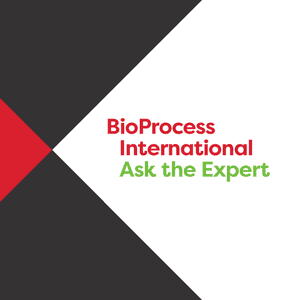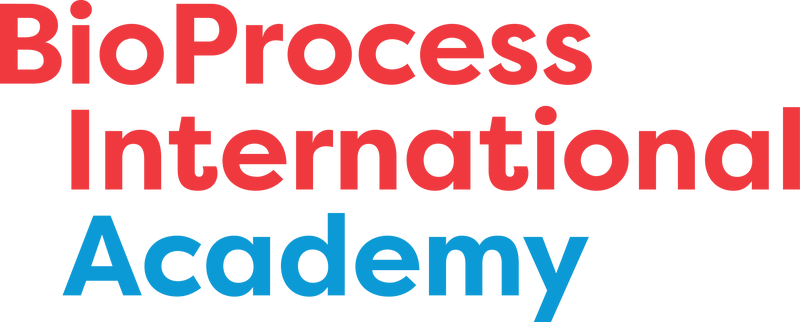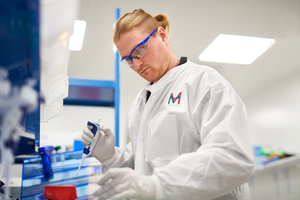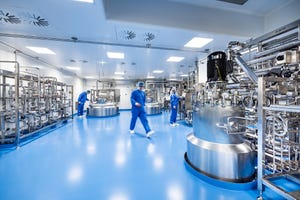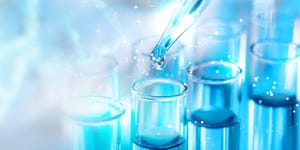The Ultimate Business Continuity Challenge: A Case Study in Ukraine
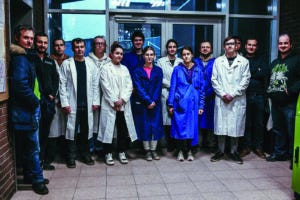
In an example of Ukrainian defiance, Enamine workers pose outside the company headquarters in Kyiv early in April 2020. (https://enamine.net).
The past few years have taught people around the world that “It can’t happen here” is never a good bet. From the COVID-19 pandemic to political upheavals to Russia’s invasion of Ukraine, we’re all experiencing a reality that would have seemed impossible not so long ago. And as numerous analysts and experts discuss on television and social media and in other publications what such events could mean politically and socially, we at BPI must maintain our focus on the biopharmaceutical industry and its associated ecosystems. With that in mind, I got in touch through mutual connections with a company in Kyiv, Ukraine, to discuss the realities of getting work done in a country that is literally under fire.
Vadim Klyushnichenko (vice president of pharmaceutical development and quality for the Calibr nonprofit translational research institute at Scripps Research in La Jolla, CA) introduced me to Enamine, Ltd. “I was very impressed with Enamine’s facility and the quality of their operations when I visited the company a couple years ago,” he said. Describing that facility as “thoughtfully built and well equipped,” he highlighted the company’s vision for further expansion from discovery research toward production and eventually even current good manufacturing practice (CGMP) manufacturing.
Klyuschnichenko also applauded the Enamine technical team’s “creativity and innovativeness based on the excellent education and extensive experience of their scientists. That’s why Scripps Research has developed a drug-development partnership with Enamine and supports the company in this difficult time.”
Klyushnichenko’s colleague Arnab Chaterjee (vice president of medicinal chemistry for Calibr) touted the company’s “excellent availability of screening compounds and synthetic building blocks,” calling Enamine “very responsive to tight budgets and timelines. Open and free sharing on current status of compound availability has been exceptional.”
Established in 1991, Enamine owns the world�’s largest stock collection of unique chemical building blocks (BBs), currently >284,000 compounds. The company serves as a partner in comprehensive research projects and provides services to drug developers around the world, from library and custom syntheses through to biology research in formulation. The name highlights both this company’s organic-chemistry expertise and its position as a supporter of drug-discovery research: Formed when secondary amines react with carbonyl compounds, enamines are considered to be versatile chemical intermediates.
A Country Under Fire
In late February 2022, Russia launched a comprehensive invasion of Ukraine in a major escalation of the ongoing Russo-Ukrainian War, which began in 2014 over the Crimean peninsula. This latest campaign had been preceded by a prolonged military buildup as well as numerous Russian demands for security measures and legal prohibitions against Ukraine joining the North Atlantic Treaty Organization (NATO). In early March 2022, Enamine founder and chief executive officer Andrey Tolmachov published an open letter to the scientific community describing the threat these developments have presented to his company and the wider industry of Ukraine (1). “We see real solidarity of the whole world to cancel or stop any economic, cultural, technological, financial connections with Russia,” he wrote, “and we urge the same from the drug discovery community.”
Business Not As Usual: A few days later, Enamine offered an update on how it was responding to the crisis by protecting its data, inventory, and workers while doing its best to contribute to the resistance (2, 3).
Data: Enamine fully transferred all of its data to safe servers outside Ukraine, thus securing its databases, internal documentation and procedures, and confidential client information. Internal systems are not tied to Ukrainian servers, which facilitates further organization of manufacturing processes outside the country.
Stock: It was impossible at the time to move the company’s collection of screening compounds and major chemical building blocks outside of Kyiv, but operations in Latvia and New Jersey could continue as usual. With governmental efforts both inside and outside Ukraine to facilitate logistics, the company was working toward replenishment of stocks in those locations with substances from the main facility.
Operations: The company relocated some of its chemists to continue work at the Latvian Institute of Organic Chemistry and at its own site in Riga, Latvia. Meanwhile, friendly organizations across Europe were expressing their interest in helping. Company leaders considered purchasing or renting an additional site in Europe or Asia as well as potential partnerships with vendors and fellow contract research organizations (CROs) to resume work at their facilities.
Charity: Enamine wanted to help the resistance acquire nonlethal military aid and enhance the defense of Ukraine, provide medical supplies to hospitals and sponsorship for science and education in Ukraine, and help its own employees scattered by war across Ukraine and abroad. With its own funds limited because most projects were necessarily on hold indefinitely, the company set up a charity fund and solicited donations for direct assistance (3).
Seeking Normality: A month later, Tolmachov was able to report some improvements to the situation in Kyiv (4). “I am thankful to the countries and businesses that support Ukraine,” he wrote. “It is hard to overestimate the importance of knowing and feeling that we are not alone in our fight for freedom.” Following a call from the government to resume operations wherever possible, some 300 chemists collectively decided to get back to work at the company facility in Kyiv. Enamine asked its clients to support their desire to “let us just do in that manner what we love and are best at” by resuming work on client orders — with some caveats. “Not all chemistry can be performed right now,” Tolmachov wrote. Large-scale synthesis and purification were difficult at first as the company ramped up to more normal operations. “We confirm that a major part of our synthetic operations can be performed and that our chemists and biologists are ready and motivated to work on your projects.”
Near the end of April, Enamine principal scientist Oleksandr Grygorenko (an associate professor at National Taras Shevchenko University of Kyiv) published a powerful and personal blog post on the company website that provides a glimpse into the realities faced by Ukrainians so far (5). He described a surreal situation of trying to get work done and continue classes through logistical challenges, misinformation and propaganda — in an atmosphere of fear, sadness, and loss. By that point, however, both university life and company operations were approaching some semblance of normal, and he was able to conclude with a sense of cautious optimism.
A Conversation
About that time, I was able to meet virtually with Ivan Kondratov, another principal scientist in medicinal chemistry at Enamine, about the company’s recent experiences and the state of the overall biomedical industry in Ukraine.
Can you give us a brief history of your company, what it does, and who it works with? How does your work fit in with the overall drug-development industry? Enamine was established at 1991 just after the USSR collapse as a screening-compound supplier. Actually, several companies in Russia and Ukraine were formed at that time and started to grow quickly. There was great interest around the world in accessing chemistry developed in the former Soviet republics, none of which was accessible to the Western world before 1991. Meanwhile, high-throughput screening (HTS) was becoming a popular technique that demanded many diverse compounds.
Enamine has created its own platform for the synthesis of screening compounds from “Lego-like” blocks that can be combined with each other using validated chemistry. The company invested many resources into increasing and diversifying its collection of BBs and make them as medicinal-chemistry friendly as possible. BBs make up the majority of Enamine’s catalog and are its most popular products. As an originator of the BB industry segment, Enamine remains its major player. Important to that growth was creation and maintenance of the REAL database of screening compounds and MADE BBs — compounds that we do not have on stock but that can be created relatively quickly by request from stock-available reagents and BBs using validated procedures developed in our laboratories.
Interest in that “virtual” but synthetically feasible space has grown now that a number of companies and research groups dealing with big data, artificial intelligence (AI), and machine learning (ML) can process huge databases to search for compounds that are potentially active biologically. Many of those researchers are using the Enamine REAL database as a benchmark for their studies. In addition, during the past five to seven years the company started working actively as a CRO, providing both chemistry and biology services. Having a huge collection of screening compounds and BBs “next door” makes us an attractive partner for such collaborations.
Have you been involved with the BioUkraine organization or US–Ukraine Foundation in any way? We haven’t been involved directly in the organization and its activities — mostly because few Ukrainian start-ups need to use our products or services. We actively collaborate with Ukrainian scientists who work in medicinal chemistry, biochemistry, and molecular biology and have consulted with a couple of start-ups that asked us for support. The Ukrainian scientific/business community knows us very well, and we’re always glad to assist in any research/initiative as needed.
For instance, Enamine supports the German biotechnology start-up company Lumobiotics (which has Ukrainian roots) by helping to develop novel light-controllable peptide drugs. We are also in close connection with Ukrainian start-up Preci, which specializes in cell models. In addition, we collaborate with AI-driven company Receptor.AI on developing drugs using AI algorithms.
The biotech industry in Ukraine has been ranked on the low side for innovation, based on data from the annual Scientific American Worldview report (6). Of course, the war will make things worse. But do you think the new visibility and support from the outside could help in the future? It is a bit difficult for me to propose the concrete steps to improve our situation after the war. It is important to do systematic work on different levels, starting from education and up to support scientists who are working in innovative areas. For example, to avoid a possible lack of workforce 15–20 years ago, Enamine invested in chemical education in Ukraine, supporting chemistry Olympiads and academic institutions from that time on. Such interactions have enabled us to build a successful ecosystem for chemists, involving them in high-ranking research work and collaborations while helping to improve their skills. A similarly versatile approach should be implemented to support the biotech industry in Ukraine.
Many biopharmaceutical companies are increasingly concerned with environmental, social, and governance (ESG) issues. How does this play in Ukraine? I’m not really an expert, but in general Ukraine is a European country, and our businesses demonstrate a willingness to follow the best Western standards. The main factor in implementing the highest ESG standards in Ukraine will be a constant dialog with European and US colleagues and partners. At Enamine, we have implemented a number of such principles after fruitful discussions with our customers.
How has outside disinformation (both before the invasion and since it began) affected Ukraine’s ability to do business with the West? I think the direct impact of propaganda on our business with the West was minor, at least for Enamine. The company has a solid reputation in the whole world, and we didn’t see any cases of disinformation among our customers. The impact has been indirect. The Russian narrative in media, diplomacy, and official statements always positions Ukraine as a “failed state,” and often such messages have influenced decision makers and investors about working in Ukraine. It is impossible to calculate such impacts.
1 Lee E. Fact Check: Claim of “US Biolabs” in Ukraine Is Disinformation. USA Today 25 February 2022: https://www.usatoday.com/story/news/factcheck/2022/02/25/fact-check-claimus-biolabs-ukraine disinformation/6937923001.
Fighting Disinformation
Reference |
The pandemic already had disrupted supply chains around the world, and many people in the biopharmaceutical industry have personal experience with that. What has the invasion done to make things worse for your company and others in Ukraine? As far as I can remember, this is the first time that the Ukrainian Chamber of Commerce and Industry has announced our situation in Ukraine as a matter of force majeure. (Editor’s Note: In contract law, a force majeure clause essentially frees both parties from liability or obligation when an extraordinary event or circumstance beyond their control prevents one or both from fulfilling obligations under that contract. Such conditions as wars, riots, and so on are separate from “acts of god” such as natural disasters.)
The impact of war is huge and difficult to overestimate for Ukrainian business. Export of grains, seed oils, iron/ore, and other goods suffer when major ports are blocked. Some businesses such as those involved in information technology (IT) have relocated successfully and continue to operate. However, most manufacturing companies in Kyiv and other affected areas had to cease operations. By early April 2022, only our EU (Riga, Latvia) and US (New Jersey) facilities could continue to work. In Kyiv, we had to stop working completely; we were able to resume work in the second week of April only with limitations. We have a significant backup of solvents and other materials now, so problems with supply are not so critical for the nearest months. However, we are going to validate an alternative chain of supply through Poland.
Fortunately our facilities remain intact. However, we have yet to assess all the losses such as from the need to evacuate employees and their families, termination of some important collaborations, logistical problems, and so on.
You’re located in Kyiv, which as the capital of Ukraine is a prime target in the invasion. Of course, many Ukrainians have had to abandon their homes and jobs and become refugees. How do you keep a company going in this environment? Are you able to move operations to other facilities outside the danger zone? What would be the logistics of doing so? Once the invasion started, we ceased operations and asked our employees to take care of their own safety and that of their families first and foremost. The situation was developing very quickly, so we were not able to organize a centralized evacuation. At the same time, we supported all employees whatever decision they made: to stay in Kyiv, to go to the center/west of Ukraine, or to cross the border. We were able to keep connections with most employees and by using messengers. Many staff members (especially sales managers) were able to continue working by remote access — answering emails, processing orders, and so on.
As for relocation, we have also taken some additional steps. Our collection of screening compounds was relocated to the west of Ukraine, closer to the border with Poland, where the company is organizing a new site for compound management and liquid handling. We relocated a team of several chemists to Riga (Latvia), where they started working in laboratories provided by the Latvian Institute of Organic Synthesis. But many chemists cannot be relocated: Male citizens 18–60 years old are not allowed to leave the country according to martial law. Currently a team of 10 chemists is working in Latvia. The plans are to extend that team and organize Enamine’s own site in Riga. There are other ideas on the table. We believe that such steps to diversify risks and organize activity at different sites will increase our resilience under these circumstances.
At the same time, Enamine’s main site continues to operate in Kyiv. Here we have our main facilities, all the laboratories and instruments. During the past few weeks, Kyiv has become safer than it was in March. Many people are coming back, and step by step we are resuming work here. Logistics continue to be the main problem because air transportation from Ukraine is impossible. We have evaluated several routes for ground transportation and begun to supply our customers that way. Hopefully, we’ll be able to accelerate the delivery of compounds, although of course that will be not as fast as it was before the invasion.
Is the Biotechnology Innovation Organization (BIO) engaging with your representatives in any way? What would you like to see that group do for the Ukrainian industry now? It is difficult to propose anything right now, but I think it is worth starting with higher involvement of Ukrainians in BIO events as well as intensive attraction of investor/functionaries from the West to communicate with Ukrainian scientists, entrepreneurs, and officials to build a solid strategy and channels of interaction. Networking is really important in this area, and intensive dialog can have a dramatic impact on further development.
In his open letter to the industry, Andrey Tolmachov asked the entire biotechnology community to isolate Russia fully — beyond economic sanctions (1). What would that mean, exactly? We believe that Russia must be isolated entirely. The past few months have demonstrated that the invasion initiated by Putin is supported by many Russian scientists, business, celebrities, and so on. That’s why we say the isolation should be total. Numerous cultural, technological, and financial connections already have been broken. The same must happen in biotechnology, with no investments in Russian (or affiliated) companies, no Russian money used for investment (e.g., Russian or related venture capitalists), no outsourcing of biopharmaceutical business to or from Russia, no scientific collaboration with Russian academia and universities, and no business or any activity (e.g., clinical trials) in Russia. Unfortunately, even now many companies continue to operate as before. Everyone who continues to work in Russia and pay taxes there should realize that by doing so they indirectly support the aggression against and killing of Ukrainian people.
What major lessons can/should be learned for the industry at large — and perhaps the rest of Europe, in particular — from the experience of Ukraine now? The main lessons are political. It may have been possible to stop Russia in 2014 when Crimea was occupied or when they began to occupy Donbass. At that time, the sanctions were rather soft, and the Western world could be accused of pacification. If the reaction had been forceful at that time, if the sanctions had been much heavier, then I’m sure we wouldn’t have the current situation. For Western countries and businesses, it was very comfortable to work with Russia, to buy Russian gas and oil, which enabled the elimination of Russian oppositionists. For instance, German business significantly depends on Russian gas and lobbied for continuing that relationship. Even now they are trying to salvage those connections.
I think the main lesson for the industry is that the days of “nothing personal, just business” are over now. Western communities and companies should have zero tolerance for the crimes of aggressive countries. The reaction should be quick and merciless. It can be painful, but this is the only way to prevent further development that can turn into even more painful consequences both for the industry and the whole community. Otherwise the Ukrainian scenario will repeat again and again.
A Cautionary Tale
With the pandemic, political strife, climate change, and other upheavals, it’s tempting to call these times unprecedented — and they certainly are within most of our life spans. But if continuing on with business as usual is no longer possible, then how do you continue? A number of governments in Europe are responding to the current situation in Ukraine not only by offering assistance, but also by recognizing the potential threat to their own status quo. One result of the invasion may well be an expansion of membership in the North Atlantic Treaty Organization (NATO) (7, 8). Biopharmaceutical companies in Europe and beyond might do well to follow their lead. Enamine’s experience shows that alliances, partnerships, and good relations with clients, suppliers, and academia are key to business continuity during times of strife.
Nearly a decade ago, a major tsunami in Japan opened our eyes to the potential for massive supply chain disruptions in the biopharmaceutical industry (9). Anyone who didn’t “get the memo” then certainly should have learned from the pandemic — and now the crisis in Ukraine — that “it” can indeed “happen here,” no matter where you are.
Scientific Publications Rayevsky A, et al. Effect of Charge Distribution in a Modified tRNA Substrate on Pre-Reaction Protein-tRNA Complex Geometry. ACS Omega 6(6) 2021: 4227–4235; https://doi.org/10.1021/acsomega.0c05143. Rayevsky A, et al. Functional Effects In Silico Prediction for Androgen Receptor Ligand-Binding Domain Novel I836S Mutation. Life 11(7) 2021: 659; https://doi.org/10.3390/life11070659. Rayevsky A, et al. Peptidyl Inhibition of Spt4-Spt5: Protein–Protein Inhibitors for Targeting the Transcriptional Pathway Related to C9orf72 Expansion Repeats. J. Cell. Biochem. 121(12) 2020: 4922-4930; https://doi.org/10.1002/jcb.29820. Shaydyuk Y, et al. Nature of Fast Relaxation Processes and Spectroscopy of a Membrane-Active Peptide Modified with Fluorescent Amino Acid Exhibiting Excited State Intramolecular Proton Transfer and Efficient Stimulated Emission. ACS Omega 6(15) 2021: 10119–10128; https://doi.org/10.1021/acsomega.1c00193. Shichkin V, Antica M. Thymus Regeneration and Future Challenges. Stem Cell Rev. 16(2) 2020: 239–250; https://doi.org/10.1007/s12015-020-09955-y. Wong JY, et al. Genetically Encoded Discovery of Proteolytically Stable Bicyclic Inhibitors for Morphogen NODAL. Chem. Sci. 12(28) 2021: 9694–9703; https://doi.org/10.1039/d1sc01916c. |
References
1 The Official Appeal of Enamine Founder and CEO Andrey Tolmachov to the Drug Discovery and Scientific Community. Enamine Ltd.: Kyiv, Ukraine, 5 March 2022; https://enamine.net/news-events/press-releases/1333-the-official-appeal-of-enamine-founder-and-ceo-andrey-tolmachov-to-the-drug-discovery-and-scientific-community.
2 Open Letter from Enamine Founder and CEO Dr. Andrey Tolmachov. Enamine Ltd.: Kyiv, Ukraine, 7 March 2022; https://enamine.net/news-events/press-releases/1334-open-letter-from-enamine-founder-and-ceo-dr-andrey-tolmachov.
3 Enamine Charity Fund: Call for Donations. Enamine Ltd.: Kyiv, Ukraine, 30 March 2022; https://enamine.net/blog/call-for-donations.
4 Tolmachov A. Resuming Work: Statement by CEO and Founder of Enamine. Enamine Ltd.: Kyiv, Ukraine, 7 April 2022; https://enamine.net/news-events/press-releases/1337-resuming-work-statement-by-ceo-and-founder-of-enamine.
5 Grygorenko O. My Experience of Russian Full-Scale Invasion. Enamine Blog 20 April 2022; https://enamine.net/blog/my-experience-of-russian-full-scale-invasion.
6 Biotechnology Innovation Scorecard: Ukraine. thinkBiotech: Washington, DC, 2022: https://www.thinkbiotech.com/globalbiotech/country/Ukraine.
7 Harrington J. Soviet-Aligned Republics That Joined NATO After the Cold War. 24/7 Wall Street 26 February 2022: https://247wallst.com/special-report/2022/02/26/the-14-former-soviet-republics-that-joined-nato-after-the-cold-war.
8 Masters J. Why NATO and Ukraine Are a Flash Point with Russia 30 Years After the End of the Cold War. PBS News Hour 22 February 2022: https://www.pbs.org/newshour/world/why-nato-and-ukraine-are-a-flash-point-with-russia-30-after-the-end-of-the-cold-war.
9 Jagschies G, Westman D, Raw D. Supply Chain Challenges in the Biopharmaceutical Industry: A Case Study Following the 2011 Tsunami in Japan. BioProcess Int. 12(8) 2014: 18–27; https://bioprocessintl.com/upstream-processing/biochemicals-raw-materials/supply-chain-challenges-biopharmaceutical-industry-case-study-following-2011-tsunami-japan.
Cheryl Scott is cofounder and senior technical editor of BioProcess International, part of Informa Connect Life Sciences; [email protected].
You May Also Like
